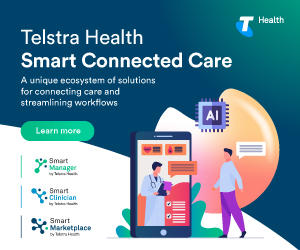12 Ted Talks every health professional should watch
Every healthcare professional at some point in their careers comes to a crossroad, or faces roadblocks, uncertainty and stress. We’ve spoken to doctors, nurses, medical students and practice managers to curate 12 inspirational and thought-provoking Ted Talks for health professionals.
1. My stroke of insight, by Jill Bolte Taylor
Jill Bolte Taylor is a brain scientist, who had the unique opportunity to study her own stroke after a blood vessel exploded in her brain. As she observed the ‘patient within’ and watched her brain functions shut down one by one, then relearning again how to think, walk and talk, she gained incredible insights to help raise awareness about stroke patient care. Importantly, she demonstrates our powerful ability to come back from a brain injury stronger, more inspirational and more impactful than before.
2. The most important lesson from 83,000 brain scans, by Daniel Amen
In Daniel Amen’s insightful analysis of the brain, he raises an interesting observation on ‘personalised care’ in mental health – and how we need to tailor patient care and treatment to an individual’s brain, not just ‘clusters of symptoms’. He also highlights the power of optimised psychiatric treatment and its ability to positively impact both the patient and their family for generations to come.
3. Doctors make mistakes, can we talk about that? By Dr Brian Goldman
Every doctor makes mistakes. But, according to physician Brian Goldman, medicine’s culture of denial (and shame) keeps doctors from ever talking about those mistakes, or using them to learn and improve. Recounting stories from his own extensive years in medical practice, he calls on doctors to start talking about being wrong and ‘redefining’ what the future of clinical practice looks like.
4. The next revolution in healthcare? Empathy, by Dr Paul Rosen
Dr Paul Rosen, MD, a paediatric rheumatologist, is on a mission to help the healthcare industry boost the patient experience. He breaks down some of the workflow changes healthcare professionals can make to minimise delays and boost patient experience, such as enabling patients to book emergency appointments online. He also uncovers a range of clinical practice habits healthcare professionals can action to decrease pain and increase comfort in medical procedures.
5. What really matters at the end of life? Dr BJ Miller
At the end of our lives, what do we most wish for? For many, it’s simply comfort, respect, love. In his moving talk, Dr BJ Miller is a hospice and palliative medicine doctor whose experiences has made him think deeply about how to create a dignified, graceful end of life for his patients. He asks us to consider the big questions about how we think of death and how to honour life. A fresh, deeply engaging talk that offers us deep insights into what really matters to our existence as individuals, and the end of our journey.
“Healthcare can become about making life more wonderful”, he says. “Rather than ‘just horrible.’ It’s about the power of beneficance. And here lies the distinction between a disease-centred and a patient or human-centred model of care.”
6. A doctor’s touch, by Dr Abraham Verghese
Modern medicine is in danger of losing a powerful, old-fashioned tool: human touch, says medical practitioner and writer, Abraham Verghese. In a digital world obsessed with ‘health data,’ Dr Verghese calls on the health profession to remember the ‘human’ aspect of patient-centric care, including the power and ritual of touch in a physical exam.
7. Millenials in Medicine, doctors of the future, by Dr Daniel Wozniczka
What does the future of health look like? And what is the role of the Millenial health professional in a highly digital, fast-paced world? Dr Daniel Wozniczka uncovers how the future health professional is digitally empowered, business savvy, entrepreneurial and are hungry to innovate and make an impact. The challenge, he argues, is maintaining this passion and drive in the face of increased pressures within the healthcare system.
“For every hour seeing a patient, I spend two hours filling out forms,” he says.”All the pressures, both the day to day pressures of being a doctor, as well as the national/economic pressures, make things more stressful for doctors, in a job that’s already stressful.”
8. Doctors in distress, by Dr Ed Ellison
Dr Ed Ellison, leader of one of the world’s largest groups of physicians, pulls back the curtain on one of medicine’s most critical issues: Doctors are suffering from burnout. As he deep dives into the issues and solutions, Dr Ellison sheds light on why it’s important not to forget the ‘humanity’ of our medical practitioners in today’s fast-paced healthcare landscape.
9. How to stay calm when you’re stressed, by Daniel Levitin
You’re not at your best when you’re stressed, and its effects on your health, wellbeing and ability to make decisions are not that great either. Neuroscientist Daniel Levitin thinks there’s a way to avoid making critical mistakes in stressful situations, as your thinking becomes clouded during ‘the pre-mortem’ “We all are going to fail now and then,” he says. “The idea is to think ahead to what those failures might be.”
10. Reading minds through body language, by Lynne Franklin
After a boy threatened to kill her with a machete, Lynne Franklin decided to learn everything she could about persuasion, and studies neuroscience to uncover the power of persuasive communication in our personal and professional lives. In her intelligent and entertaining talk, she reveals some of the softer, subtle skills we can be mindful of in those micro-moments of communication to enable more clearer, positive and impactful outcomes.
11. How to sound smart in your TEDx Talk, by Will Stephen
In a hilarious talk capping off a day of new ideas at TEDxNewYork, professional funny person Will Stephen shows some light-hearted and engaging ‘presentation skills’ to make you sound brilliant – even if you are literally saying ‘nothing’. A light-hearted take on mastering the fine art of communication, persuasion, influence and leadership.
12. Why some of us don’t have one true calling, Emilie Wapnick
What do you want to be when you grow up? Well, if you’re not sure you want to do just one thing for the rest of your life, you’re not alone, according to writer and artist Emilie Wapnick. In this engaging and heartfelt talk, she describes the kind of people she calls “multipotentialities” — who have a range of interests and jobs over one lifetime.









